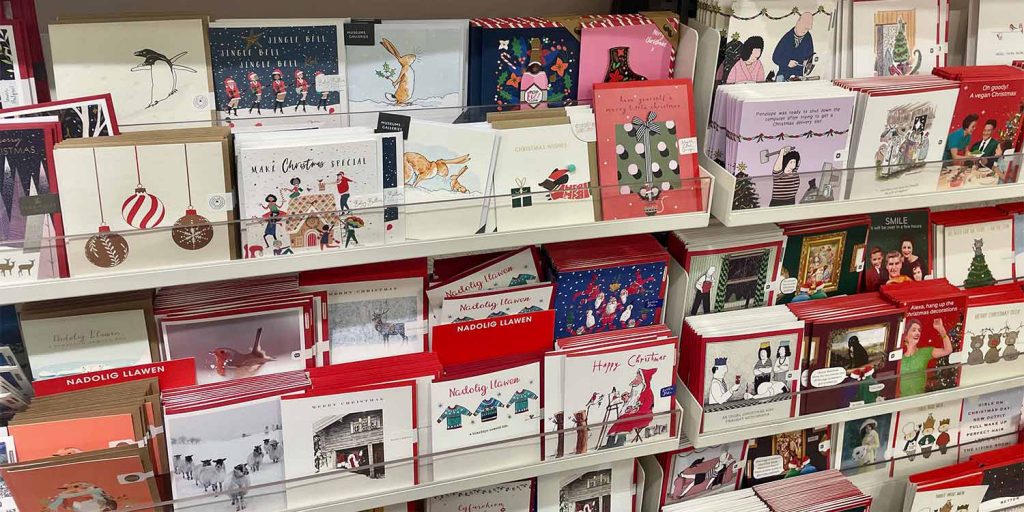It’s perhaps unsurprising that Christmas dominates the greetings card market, but finding a card for another holiday, even in the Welsh capital, can be near impossible

While it might feel surprising that in a large and diverse city like Cardiff finding greetings cards for religious occasions – Christmas aside – is so difficult, for people who observe these other holidays and festivals, it’s a familiar reality.
Despite a real variety of holidays and celebrations being celebrated throughout the year, it can be difficult to find relevant greetings cards without seeking out smaller sellers online. Take Diwali, for instance. There are over 800,000 Hindus in the UK, per the 2011 Census, and over 400,000 Sikhs, many of whom also celebrate the holiday, yet a trip through the city centre of Cardiff in the days leading up to Diwali in search for greetings cards proved almost entirely fruitless.
According to the latest estimates from Stats Wales, there are 55,500 Muslims in Wales and 84,400 people who follow a religion aside from Christianity or Islam. While these might be small numbers when compared to the three million people in Wales altogether, this is still an awful lot of people.
Around the UK
It’s a UK-wide issue, too. Moya lives in Hertfordshire and is Jewish, but had to travel to Golders Green, which has a large Jewish population (Finchley and Golders Green is the political constituency with the largest Jewish population in the UK) to find any Jewish holiday cards: “Aware as I am that the UK is predominantly white Christian as a nation, there is a huge diverse culture of people living here which come from all over the world and the Jewish community is one of them.
Check out the video below for more information:
“There is a demand for these cards to be sold which, if market research was undertaken, would suggest there is a large enough selling point for multicultural/faith holiday cards to be sold that are not exclusively Christmas-based.”
Where high street retailers are failing, however, independent creators are doing their best to fill the gap in the market. Sites like Thortful and Etsy stock myriad cards from designers, celebrating everything from Hanukkah and Diwali to even contemporary and secular events like National Grandparents Day.
Not having holiday cards that aren’t white Christian-based is an act of institutionalised exclusion
Moya
One such designer is Natalia Gonzalez, whose cards are sold via Thortful and range from jovial beer-themed birthday cards to those which celebrate Diwali, Hanukkah and even Kwanzaa.
Natalia explains that she’s always on the lookout for ideas and holidays to illustrate, discovering traditions and researching them to find out more: “I love to come up with pretty and modern designs for traditional holidays,” she explains, “if I had enough time I would like to cover all of them just because I think they are very interesting.”
While realizing that the focus is on the most popular holidays simply because of demand, Natalia thinks “it would be nice if anyone could find a card to celebrate their favourite holiday.”

The retailer fighting back
John Lewis, the only retailer visited in Cardiff to stock Diwali cards, makes a particular effort to provide inclusive products representative of a number of religions. Sarah Moughtin, Partner and Buyer, Greetings Cards says the company are proud to help customers celebrate a range of religious events with not only greetings cards but instore popups to help find food, drink and gifts.
“Within our buying team, we work with our Faith network to ensure designs are appropriate and that we continue to educate ourselves on each occasion…We know there is still more to do but are proud of the important work we have achieved to date to make our selection of products more inclusive,” she claims. However, it might be fair to say that the department store, which even in recent weeks has been criticised by some as “woke”, is the exception, not the rule.
Double standards?
Is it part of a wider pattern? The UK’s official religion is Christianity, and in the 2011 Census almost 60% of people in England and Wales described themselves as Christian, but while a focus on Christianity is to be expected, are other religions being treated – if not with outright disrespect – incredibly flippantly?
Back in 2020, the then Secretary of State for Health and Social Care Matt Hancock announced just three hours before Eid that there were to be new restrictions on mixing, scuppering plans for many. Come the end of the year, amid calls to ‘save Christmas’, the double standards were pointed out by many across the media – it probably wouldn’t be a stretch to view the lack of diverse cards as a symptom of a much wider issue.
Some might argue that, in the grand scheme of things, greetings cards aren’t a particularly big deal. After all, there are plenty of options online. However, when only one of the multiple retailers visited in Cardiff stocks Diwali cards, and when people have to travel to London simply to find a card for Hanukkah, this becomes contentious. As Natalia says, “Knowing about the traditions and holidays of other cultures make us feel closer to them and keep us interested in what’s different, so I think those holidays deserve more presence in the greetings card business.”
“I think [retailers] need to step up their game as not having any holiday cards that aren’t white Christian-based is an act of institutionalised exclusion of other cultures,” Moya adds.
With so many holidays at the end of the year, is it too much to ask for high street retailers to stock cards for them all, and not just Christmas? There are millions of people across the UK, and over 100,000 in Wales, who are being ignored.
Religious/Cultural Holiday Calendar 2022
There are plenty of festivals each year, and 2022 is no different. Here are some of the major holidays to look forward to.
Holi – 17-18 March
Vaisakhi – 14 April
Easter Sunday – 17 April
Eid al-Fitr: 2-3 May
Vesak – 6 May
Eid al-Adha: 9-13 July
Yom Kippur – 4-5 October
Diwali – 24 October
Hanukkah – 18-26 December
Christmas – 25 December
Kwanzaa – 26 December-1 January
